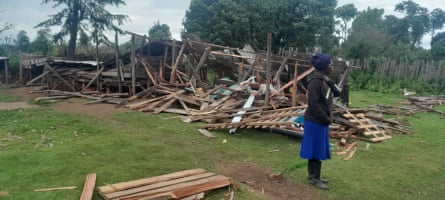Human rights organizations are urging the Kenyan government to cease the forced removal of the Indigenous Ogiek community from their traditional land in the Rift Valley.
Cyrus Maweu, the deputy director of the Kenya National Commission on Human Rights (KNCHR), has urged for a prompt halt to the current demolitions and evictions.
Recent conflicts between the local community and the Kenyan government have resurfaced as rangers from the nation’s wildlife and forest services have started evicting the Ogiek people from their residences in the Mau forest. According to community leaders, approximately 400 homes have been destroyed, resulting in families being displaced or forced to seek refuge in temporary shelters due to heavy rainfall.
Daniel Kobei, the executive director of the Ogiek Peoples’ Development Program, expressed that they are currently living in a state of extreme fear. He reported that on the first day, the destruction of homes began with the use of axes, hammers, and machetes. The destruction even extended to the school, and the following day, some homes were set on fire. As of now, heavy machinery is being used to demolish remaining homes that were not completely destroyed. This has resulted in the destruction of everything in the area.
Community leaders are concerned that buildings with cultural significance may face destruction. Kobei stated that this type of destruction could lead to the disappearance of a community.
For years, the community has been forcibly removed from the Mau forest, which is Kenya’s biggest source of water. After a lengthy legal dispute between the Ogiek and the Kenyan government, the African court on Human and Peoples’ Rights ruled in 2017 that the Ogiek have historical ownership of the Mau forest and are entitled to occupy it. In a 2022 decision on reparations, the court instructed the Kenyan government to define, mark boundaries, and grant land titles to the Ogiek for the area they have traditionally inhabited.
According to rights groups and Ogiek leaders, the government has been slow in implementing the significant judgments, leaving them vulnerable to ongoing violations.
The recent slate of Ogiek evictions in the Sasimwani and Nkareta areas of the forest follows directives by the Kenyan president, William Ruto, last month ordering security agencies to remove illegal settlers. Protecting Mau forest resources was necessary to fight the climate crisis, Ruto said, and any illegal settlers removed would be allocated land.
For a while now, officials have asserted that evictions are vital for safeguarding the Mau ecosystem against severe deforestation caused by illicit logging and land clearance for agriculture. They have further stated that the intrusion jeopardizes crucial water sources that millions of Kenyans depend on.
Maweu stated that the concerns are legitimate, however this does not imply that conservation and human rights cannot coexist. The key is to find an approach to conservation that is based on human rights and does not involve exclusion.
Certain individuals who have established homes in different areas of the forest possess legal ownership of land within the Mau forest. However, the legitimacy of these titles is being challenged. According to human rights organizations, conflicting assertions are making the ongoing conflict more complex and the arbitrary removals are negatively impacting the land rights of the Ogiek communities.

The national rights commission of Kenya expressed concern this week about the ongoing evictions, stating that they were being conducted without properly identifying and profiling the forest-dwelling communities affected.
NGOs advocating for human rights and leaders of the Ogiek community have stated that the government did not follow appropriate procedures for eviction, such as providing prior notice to affected communities and implementing resettlement plans. Otsieno Namwaya, the director for East Africa at Human Rights Watch, stated that the current eviction methods are in violation of both Kenyan and international laws.
The leaders of the Ogiek community expressed surprise at the recent evictions, as they had previously had productive discussions with environmental officials about implementing the African court’s ruling.
The Ministry of Environment did not provide a response to inquiries for a statement.
Organizations advocating for human rights have stated that prompt actions must be taken to address the ongoing evictions. According to Maweu, if the issue is not resolved in a sustainable manner, it is likely to happen again in the future.
Source: theguardian.com
















